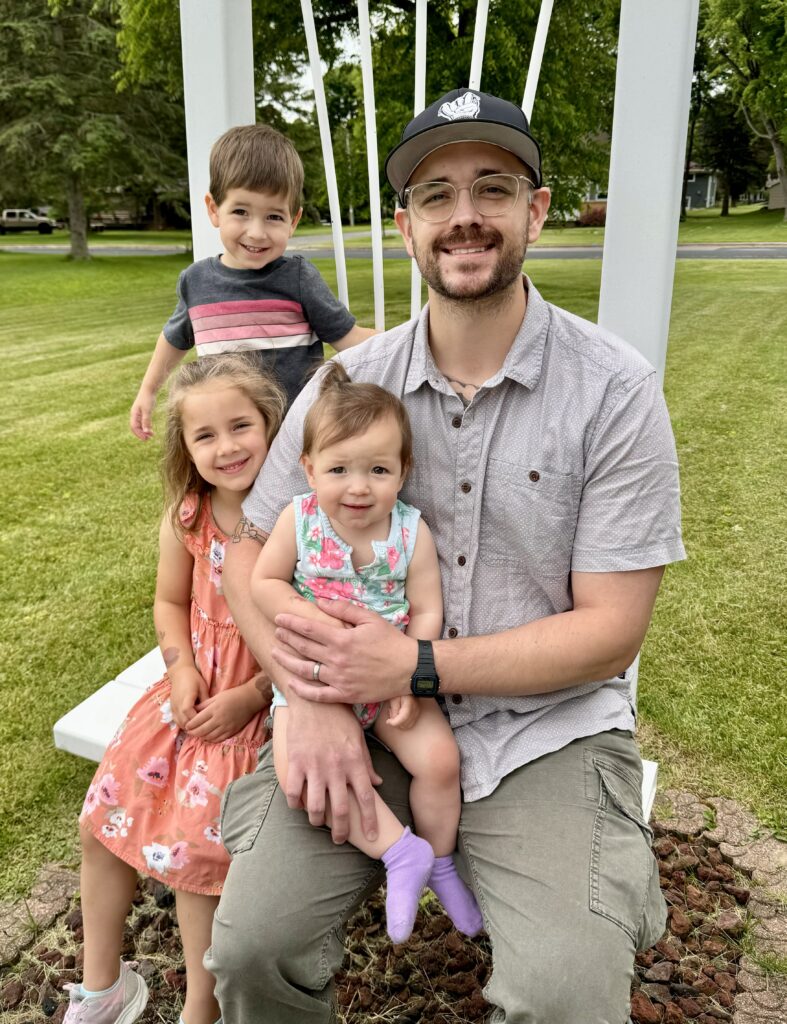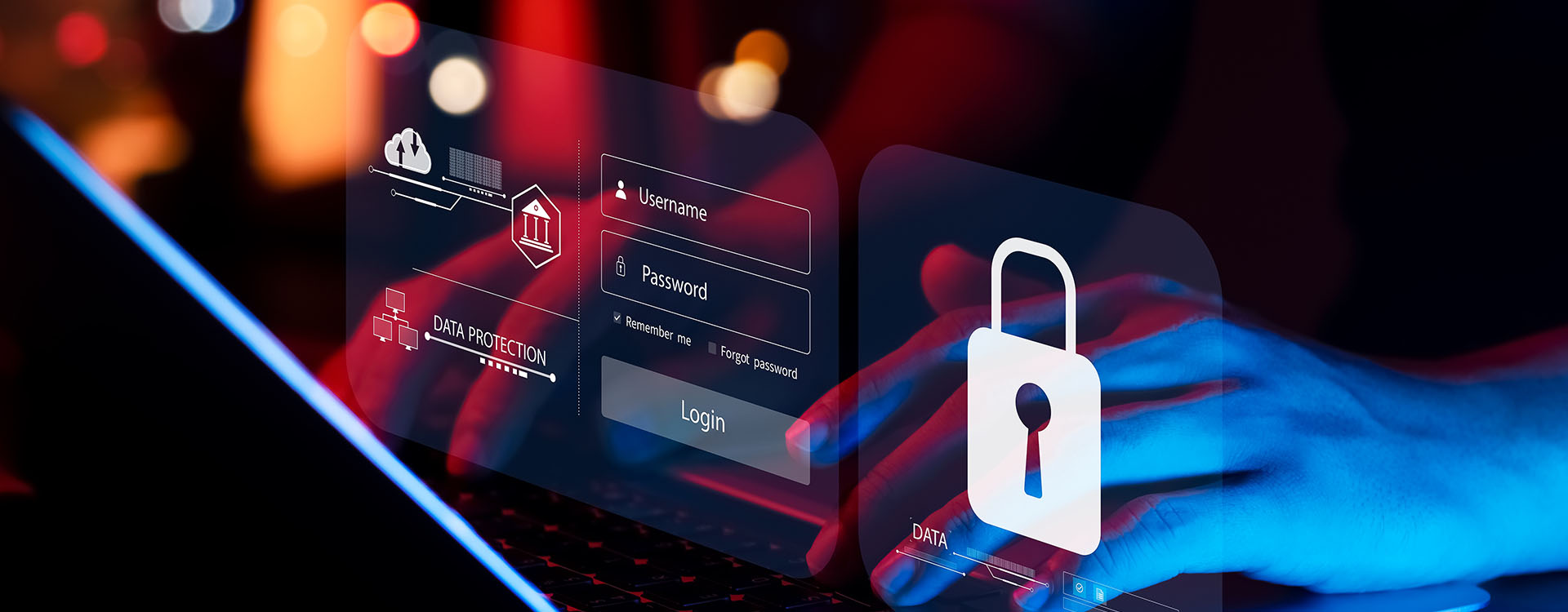Tyler Wester has learned how to better manage his time, and he’s gained the confidence and skills necessary to excel at his information technology security job since enrolling in the Master of Science in Cybersecurity program.
Tyler, a 33-year-old father of three children under five, started his master’s when his youngest was born.
“Studying and doing classes and working and raising children has been a challenge and I’ve had to hone my ability to prioritize and manage my time,” he says. “The huge benefit of the program is that the courses are 100 percent online, so it gives me the ability to still have my professional career, come home and spend time with the family and then usually at night when the kids go to bed is my time to study and do homework. My kids go to bed at 9 p.m., so I know 9 p.m. to midnight is my time to study and then I’m back to work. The flexibility of doing your coursework anytime is huge for me because I wouldn’t have been able to do it otherwise. I wouldn’t be able to attend in-person classes.”
 In 2015, Tyler received his bachelor’s degree in information technology and moved to the Oshkosh area, where he started his career as a Systems Analyst and Software Developer. For the next nine years, Tyler gained valuable skills in software and engineering working on enterprise applications and technology, which led him to his current role at Miller Electric as an Embedded Software Engineer—Product Security.
In 2015, Tyler received his bachelor’s degree in information technology and moved to the Oshkosh area, where he started his career as a Systems Analyst and Software Developer. For the next nine years, Tyler gained valuable skills in software and engineering working on enterprise applications and technology, which led him to his current role at Miller Electric as an Embedded Software Engineer—Product Security.
“My first role at Miller Electric was as a software developer on the Welding Intelligence team, focused on web, desktop, and IoT solutions,” he says. “Three months ago, I transitioned into my current role, which is security-focused. My official title is Embedded Software Engineer, Product Security.”
Tyler has applied what he’s learned in class directly to his job. He is on the Security Architecture track, one of four tracks cybersecurity students can specialize in. (The other three available tracks are digital forensics, cyber response, and governance and leadership.)
“Much of what I’ve learned in class translated to my work because we’re doing many of the same things, whether it be cryptography or security planning,” he says.
Tyler decided to pursue a master’s degree in cybersecurity because he thought it would be a great focus in the future.
“I thought, ‘Oh, maybe I go back to school,’ and then I just was Googling around, and I found the program I’m in now. At Miller, they do a great job of promoting continued education, so they supported me throughout this process of returning to school and thinking about the future.”
Tyler must be proactive about managing his online coursework. He engages in time boxing, which means he sets aside periods of his day to complete specific activities.
“Being able to set time specifically aside, having an environment that suits me and my ability to work efficiently is really important,” he says. “That’s probably one of the big things too, is having the right environment, whether physical or mental.”
Learn more about our 100% online degree and certificate programs.![]()
Get Program Guide
Tyler hopes to graduate in Fall 2025. He’s already planned the courses he wants to take from now to the end of his degree.
“There are multiple divisions that need secure software development, so it’s hard for just one person to do it,” Tyler says. “I could see just the team growing because of the focus on security.”
CYB 715: Managing Security Risk was more difficult than Tyler thought it might be.
“How do you estimate the impact of various threats, risk impact likelihood?” he asks. “How do you put a number to that and have it be accurate? It’s hard to estimate how much a data breach or a leak of certain information would cost a company, but you see it all the time. It could cost a company a lot if something bad happens, but you don’t know until it happens.”
“But planning and preparation reduces the risk for an organization. It’s almost impossible to fully eliminate it, but you can put layers of defensive strategies in place. You’re always going to have the weakness of people because people have emotions.”
Now that he’s focused on security, Tyler has a renewed perspective on his career.
“I’ve been in software engineering. I’ve been on the application development side, but now having looked at software, planning, and strategic alignment through a security lens, it’s just a different view of my past experience. Translating what I’ve learned from a security perspective has been interesting. It has helped me throughout my career up to this point and beyond,” he says.
Tyler enjoys the variety of courses the master’s degree program offers.
“The program helped me get up to speed quickly on a baseline cybersecurity landscape and dive into all these different focuses. And I think the courses are well planned out and diverse in the sense that you have planning and implementation, cryptography, risk management, and all these different things that encompass all of cybersecurity that can then be implemented in different organizations and different focuses. Because my focus is product security, which is much more granular than if you’re doing this for work like a whole organization.”
While Tyler’s courses are 100 percent online and he doesn’t have face-to-face contact with his peers, he gets a lot of support.
“Being in this role and being in school, it’s given me purpose and I’ve enjoyed the challenge even though it’s been difficult because it’s such a new territory. I feel like I have a lot of support from the program, and my professors. I’ve made many connections and can reach out to those individuals if I have problems or to bounce ideas off.”
The program has also improved his confidence.
“I think having that mindset of reaching out and connecting with the cohort is important. If you want to feel like a part of something and have that support, be proactive in reaching out and do your best to be a part of the team. Surround yourself with people with the same intentions and motives, and good things will happen.”
Ready to learn more? Check out the program curriculum or connect with a helpful enrollment adviser at 608-800-6762 or learn@uwex.edu.
UW Cybersecurity is a collaboration of the Universities of Wisconsin campuses.









